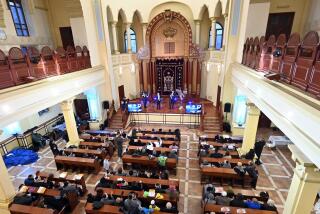From Stalin with love: a haven for Yiddish culture in Siberia
“L’Chayim, Comrade Stalin!” tells a cross-cultural story as dizzying as its title. Energetic and informative, albeit more than a little haphazard, Yale Strom’s new documentary explores an unexpected aspect of the intertwined 20th century histories of the Soviet Union and the Jewish people.
Strom, whose best-known film is the music-themed “The Last Klezmer,” here investigates the Jewish Autonomous Region, or JAR, a Russian social experiment that sounds as fantastical as any science-fiction script. Often referred to by the name of its capital, Birobidzhan, it was an official Jewish homeland created by Joseph Stalin 20 years before creation of the state of Israel.
That would have been in 1928, when Stalin got the notion of disposing of Russia’s problematic Jews by encouraging them to move to Birobidzhan and become a Yiddish-speaking agrarian proletariat.
The Belgium-sized area he selected, on the far eastern border of Siberia, was closer to Korea than to Moscow. It soon became known to other Russians as “a very small Jewish town at the end of the world.” By 1948, the Jewish population had maxed out at 45,000 residents, about a quarter of the region’s residents.
Jews came to Birobidzhan both from Russia, where famines in other areas encouraged emigration, and from overseas, where extensive recruitment in North and South America led to people like the Akron, Ohio, milkman who woke up one morning, his daughter remembers, and moved his whole family, complete with useless tennis gear, to the region.
The lure for these people was a kind of heedless idealism as well as a yearning for a state to call their own. People were “young, full of dreams and patriotism,” a resident remembers, a situation captured by clips from the rare 1936 Soviet-made propaganda film about the JAR called, typically, “Seekers of Happiness.”
What they found, after a 10-day train ride from Moscow, was anything but joyous. Instead of paradise, the newcomers saw a tent city in a muddy, dismal swamp that was frigid in winter and a mosquito haven in summer.
Filmmaker Strom, himself a Yiddish speaker, is understandably fascinated by the region, and has done a good job of tracking down former childhood residents who have moved on and current Birobidzhaners who have pungent memories.
For though the region was supposed to be a stronghold of Yiddish culture, Stalin’s increasing paranoia about the Jews gradually made life there untenable. There was spying, purges and an eventual banning of the teaching of Yiddish. One man even remembers being arrested for “Jewish chauvinism” for giving the traditional salutation “L’Chayim!” (to your health) upon the birth of his son.
While the singularity of the Jewish Autonomous Region makes it a fine documentary subject, “L’Chayim, Comrade Stalin!” does not always do it justice. The film’s interviews, vivid though they are, tend to have an undigested feeling, giving the film the texture of an elaborate home movie. Perhaps in an attempt to compensate, other parts of the film are overproduced, laced with disruptive visual and aural gimmicks.
But, like Birobidzhan itself, this film does not give up the fight. It closes with glimpses of the city today, when Yiddish is once again being taught and the language has more of a presence that it had for years.
Yes, one of the city’s teachers says with a shrug, Yiddish has been authoritatively declared nearly dead for years, and it’ll likely survive in that state for years to come.
*
‘L’Chayim, Comrade Stalin!’
MPAA rating: No rating
Times guidelines: Adult subject matter
The Cinema Guild presents a BlackStream Films production. Director Yale Strom. Producer Elizabeth Schwartz. Screenplay Elizabeth Schwartz. Cinematographer Nils Kenaston. Editor Yefim Gribov. Music Yale Strom. Running time: 1 hour, 30 minutes.
Laemmle Music Hall, 9036 Wilshire Blvd., Beverly Hills. (310) 274-6869.
More to Read
Only good movies
Get the Indie Focus newsletter, Mark Olsen's weekly guide to the world of cinema.
You may occasionally receive promotional content from the Los Angeles Times.











